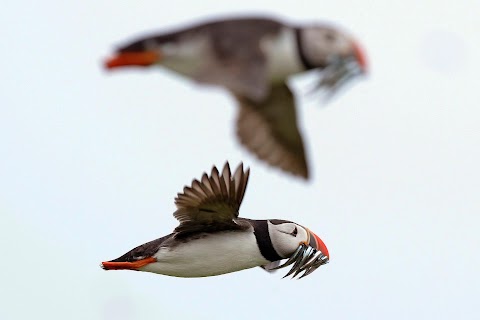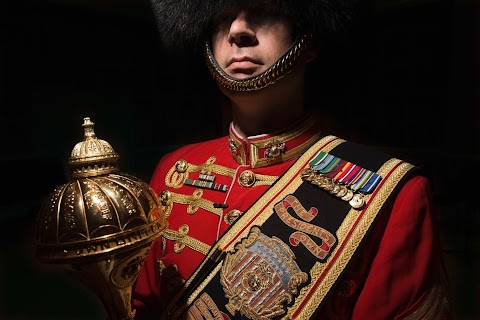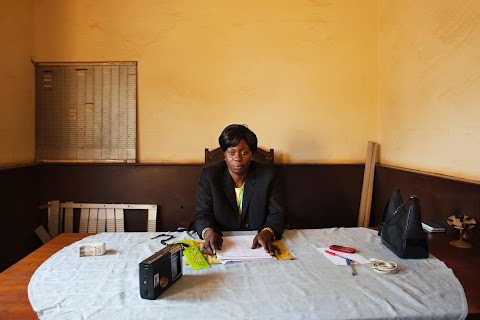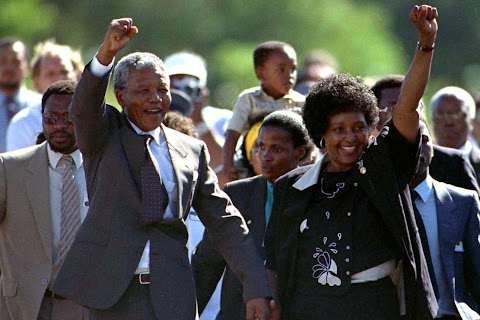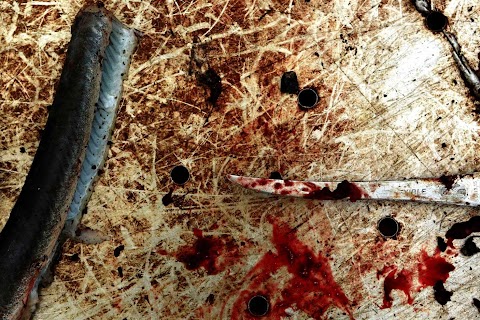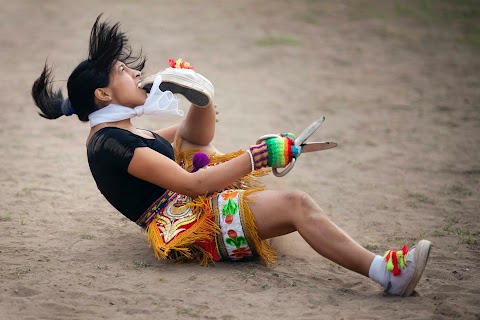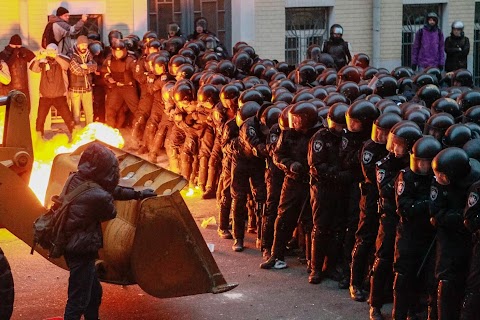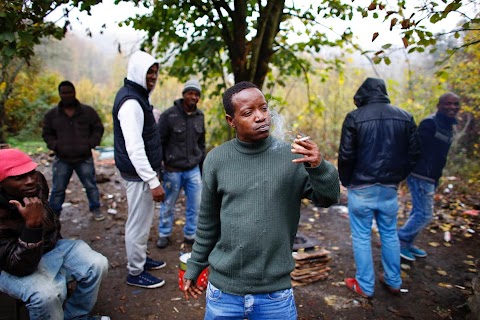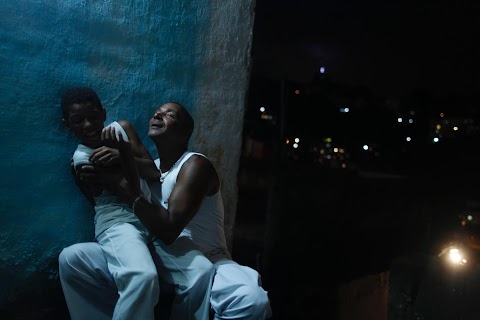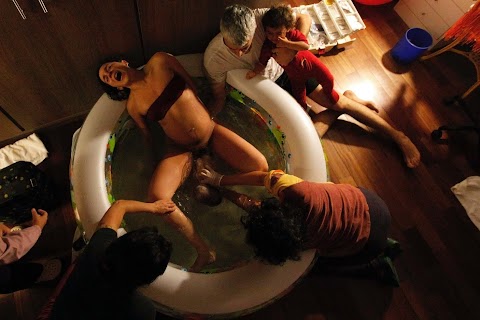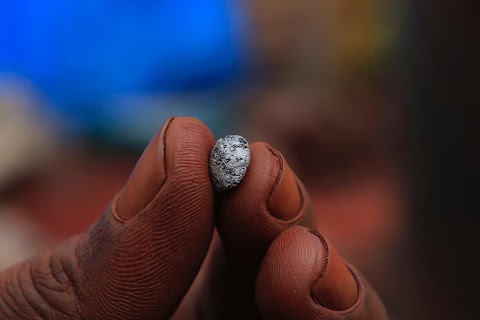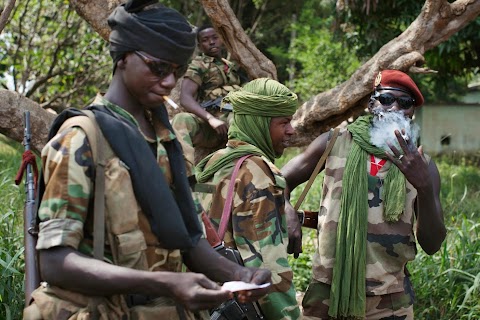
Fishing and Firearms
 Siegfried Modola
Siegfried Modola
With a gun resting across his shoulders, a man from the native Turkana community of northwestern Kenya heads towards the shores of Lake Turkana, on the border with Ethiopia.
The once plentiful waters of the vast lake are overfished and fierce clashes have broken out in the area, as the Turkana tussle with old rivals, the Ethiopian indigenous Dhaasanac, over dwindling resources.

The Turkana have long been pastoralists who live off their livestock. But the corner of northwestern Kenya where they are based suffers from recurring droughts, which have damaged the pasture they need to feed their herds, causing many to turn to fishing.
It has been a sharp cultural shift for many Turkana, a community where a man's status can be bound up with the size of his herd, and "fish eater" was once an insult.

Ngimalia Ilete, who still follows the old pastoralist way of life, displays traditional scars, which are supposed to demonstrate that he is an able warrior who has killed enemies in the past.
Ilete is the leader of a Turkana cattle kraal in the Ilemi Triangle, a disputed territory in the very northwest of Turkana, on the border with Ethiopia and South Sudan.
“This is a bad season. Look how dry it is. Our people are hungry. Conflict increases when people are hungry,” he said.

For many Turkana, fishing offers the only stable source of income at a time when changing weather patterns are jeopardising the security of keeping livestock.
But Lake Turkana's fish stocks have diminished, fuelling conflict with the Dhaasanac, whose pasture lands have been eaten away at by big agricultural projects in southern Ethiopia, and who now head ever deeper into Kenya in search of the resources they need.
The two communities have long been adversaries, fighting over grazing grounds and raiding each other’s herds. But clashes between them now are becoming more deadly, as the area is flooded with guns from other regional conflicts.
Slideshow

Turkana fishermen sail into deeper waters on Lake Turkana, near the Kenyan-Ethiopian border.

Fishermen retrieve their fishing nets, which they left in the lake overnight.

A man rests in his boat during a fishing expedition.

A Turkana fisherman cleans his catch.

A man attempts to climb back up onto his boat after untangling a fishing net from floating weeds.

A Turkana man cleans freshly caught fish on the shores of the lake.

He washes the fish in the water.

A Turkana man and a boy carrying a gun look on as a G3 battle rifle hangs from a structure used to dry fish.

A boy walks under lengths of wood where fish hang to dry.

A Turkana man herds livestock back from grazing grounds at the end of the day in the disputed Ilemi Triangle, near the borders with Ethiopia and South Sudan.

Turkana fishermen prepare a meal at night on the shores of the lake.

A herd of livestock stands inside a cattle enclosure known as a kraal, as food is cooked on a fire.

Simon Choko, a community leader from a fishing camp near the shores of Lake Turkana, shows a bullet wound which he says he sustained while repulsing an attack by Dhaasanac raiders.

Lightning flashes over livestock inside a Turkana cattle kraal.

A Turkana man stands at the entrance of a kraal at dawn.

A man at a Turkana fishing camp looks out towards Lake Turkana as he wakes up under a mosquito net.

A woman with traditional Turkana scarring sits in a kraal.

The skin of a large wild cat, which was shot after attacking several goats, hangs on a protective bank of branches, constructed to keep livestock safe.

A Turkana man walks past a row of guns at a fishing camp on the shores of Lake Turkana.

Kenyan soldiers from the Rapid Deployment Unit, an emergency unit in the area because of reoccurring clashes between the Turkana and Dhaasanac communities, look at the carcass of a cow that starved to death.

A Dhaasanac man from southern Ethiopia helps Kenyan soldiers from the Rapid Deployment Unit to lift a dying cow.

A soldier from Kenya's Rapid Deployment Unit looks at a starving cow, a few hundred meters from the official Kenyan-Ethiopian border.
"The conflict has become ever more fatal as automatic weapons from other regional conflicts seep into the area."When Simon Choko goes out fishing on Kenya’s lake Turkana, he brings a gun as well as a net.
In the drought-stricken corner of northwestern Kenya, the native Turkana community to which Choko belongs is involved in deadly conflict with rivals from across the border in neighbouring Ethiopia, as the poor populations compete for scarce food.
“I have been a fisherman since I was a boy and I have never experienced such a tense and dangerous period as the one we are living now. Everyone has a gun these days to protect themselves against attacks,” said Choko.
The Turkana are traditionally nomadic pastoralists but they have seen the grass that they need to feed their herds wither in the face of recurring droughts. As conditions change, the Turkana have had to change too, and many have turned to fishing.
The trend began back in the 1960s, following a devastating drought, which wiped out entire herds. As a new source of survival, the government started to introduce communities to fishing in the plentiful waters of the vast and then mostly untouched Lake Turkana.
Authorities gave out fishing nets and resettled affected communities in villages along the shores of the lake. A new economy geared up, although for many it was a way to save money by selling fish in order to eventually restock their lost herds and go back to their pastoralists roots.
But things have changed again. Lake Turkana is overfished, and scarcity of food is fuelling long-standing tensions with Ethiopian indigenous Dhaasanac, who have seen their grazing grounds squeezed by large-scale government agricultural schemes in southern Ethiopia, and who now venture ever deeper into Kenyan territory in search of fish and grass.
The conflict is just one example of clashes that take place between different ethnic groups in various parts of Kenya over cattle-raiding, politics and limited resources.
Here, the Turkana community fishing near Todonyang, close to the Ethiopian border, have formed themselves into a well-organised armed group, as they fear attacks both on the lake and on the shores, where they have set up temporary fishing camps.
Fighting between the communities has a long history, but the conflict has become ever more fatal as automatic weapons from other regional conflicts seep into the area. According to locals, around a dozen Turkana have been killed in clashes since July.
“The Turkana and the Dhaasanac have been enemies for a long time. However, before they used [to] fight with spears and other rudimental weapons,” said Turkana leader Pius Chuchu.
“Then came the single bullet carbines. Now everyone has these modern guns such as AK47 that even young boys can carry and use,” he said. In one particularly bloody incident in 2011, dozens of Turkana were killed in a single cross-border raid in Todonyang.
Although the area is short of basics like grass and ground-water, it contains other resources including oil reserves and massive, newly discovered underground aquifers.
Development of these assets could bring much-needed relief to Turkana County’s 855,000-strong population, which suffers from a poverty rate of 94.3 percent according to a 2012 report by Oxford University’s African Studies Centre.
Choko said he was eager for the opportunities that development could bring, but some Turkana are worried that, as the bounty begins to bear fruit, they might miss out on the benefits.
In October, Turkana protesters halted operations by the company Tullow Oil, marching on exploratory drilling sites and demanding jobs and other benefits. The company said the dispute had been resolved almost two weeks later, after dialogue with the community.
Anthropologist Alberto Salza, who has done extensive work in the area, says that the development of aquifers could lead to big, agricultural schemes that will eat into pasturelands, something that will harm the Turkana’s traditional way of life.
Such agricultural projects in Ethiopia, connected with the construction of a massive dam on the river that feeds Lake Turkana, have already displaced tribes there.
But while Salza sees the threats that development could pose to the Turkana’s old lifestyle, he believes the Turkana will once again have to change.
“Around Lake Turkana, tradition is a killer: if you don’t adapt and change, you die. I’d like to be here to see the “new” Turkana: they have a right to modernity,” he said.
]]>